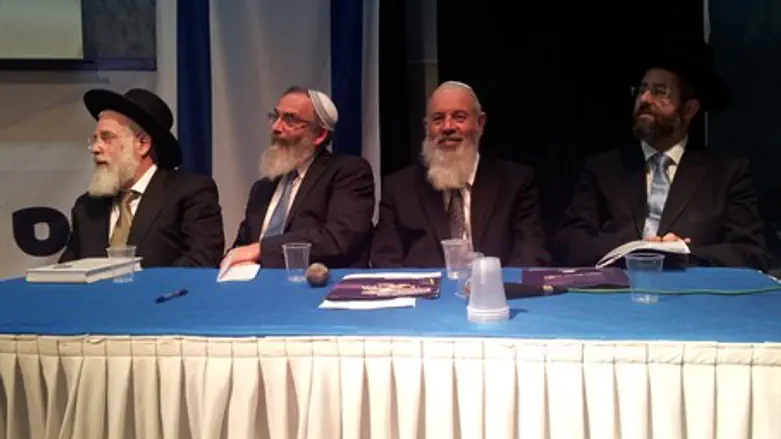
Four candidates for the post of Chief Rabbi of Israel discussed the topic of Jewish law and state law in Israel at a panel Tuesday at the Ramle Conference.
Rabbis David Lau, Eliezer Igra, David Stav and Yaakov Shapira each shared their views on whether the Rabbinate should have any authority in state affairs, and if so, when and to what extent.
Rabbi David Lau, the rabbi of Modiin, said, “Judaism speaks about economy and security; King David needed authorization from the Sanhedrin before going to war. There is room for the Rabbinate to speak on these matters, and when the Rabbinate broadcasts caring for each and every member of the nation of Israel, there is no doubt that they will listen to the Rabbinate in turn, will want to hear its opinion… they will know it comes from a heart that cares.”
Rabbi Eliezer Igra, a dayan [judge] in highest court of Jewish law [beit din] in Israel and rabbi of Kfar Maimon, said, “The king and kingship are given to the nation, and the nation may decide the form of government. We are in a democracy, so what we are talking about is from that point, how to connect the power of leadership to the power of Torah.”
Rabbis need to share their views, but do not need to deliberately get involved in politics or to express an opinion on each of the many matters the government deals with, he continued. “Ultimately Jewish law is based on professional knowledge and not every rabbi knows all about finance and technology. But when the Rabbinate deals in these matters I think it ultimately brings honor to the Rabbinate… The Rabbinate doubtless needs to make its voice heard regarding justice and charity in particular,” he said.
Rabbi David Stav, the rabbi of Shoham and head of the Tzohar rabbinic organization, said, “When the Rabbinate gets involved in state affairs, it needs to have the tools… Sometimes we hear two security experts with opposite views. When rabbis want to express the Torah view, they need to see reality through the government’s eyes, to understand the tools with which society and economy are discussed.”
He continued, “To deal with national matters we need to change the disc. To understand that we are not in the shteibel, that we are dealing with a country. It requires a broad, national perspective… The position needs to be based on understanding of the system we are working with.” He added, “There is no doubt that a rabbi’s job… includes assisting in any case of distress, or evil, economic, social or other.”
Rabbi Yaakov Shapira, head of the flagship religious Zionist Merkaz Harav yeshiva founded in Jerusalem by Israel's first chief rabbi Rav Avraham Hakohen Kook, said, “The Chief Rabbinate’s value is educational, is values, and the more we internalize that the more we will know that words can affect reality. The questions that come up today, because there are so many public issues, the questions are so heavy that even those at the top of the pyramid would doubtless want to seek assistance in the form of advice from hundreds of rabbis…and we must deal with them in the Chief Rabbinate and do so in that way so that they will be accepted. We must strengthen the image of the rabbinate and its rabbis in a positive way.
“The Chief Rabbinate is a halakhic, values-oriented and educational institution and so the Chief Rabbinate should strive to turn the Rabbinate into a welcoming address not only for those who keep Torah and mitzvoth, but also for those who do not,” he said.